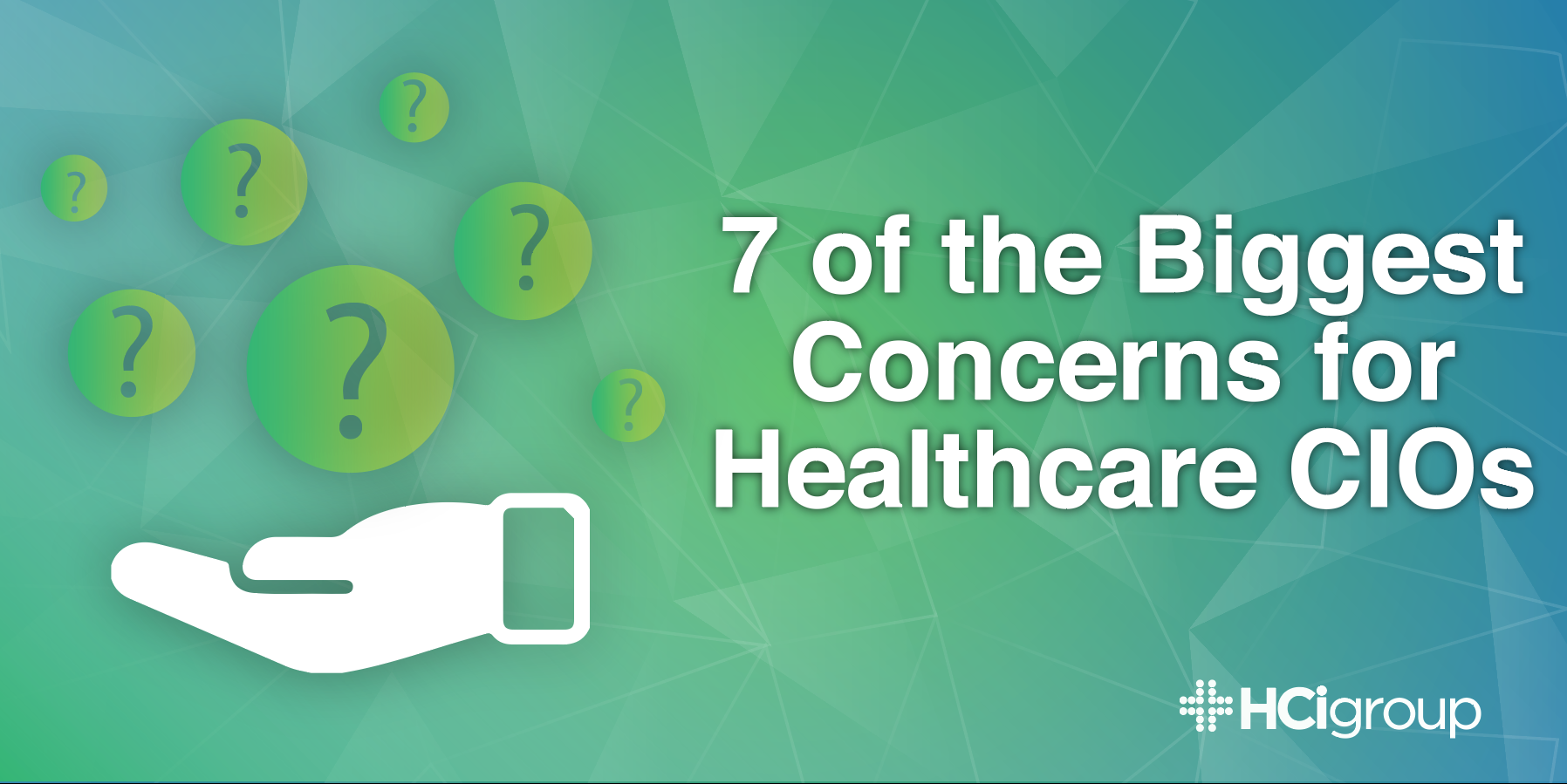Seven of the Biggest Concerns for Healthcare CIOs


Healthcare CIOs have many concerns.
From protecting patient information to optimizing EHRs to improving the patient experience, CIOs must do much with relatively little.
Budgets are largely consumed by compliance initiatives, meaningful use investments and keep-the-lights on infrastructure requirements, thereby often forcing healthcare organizations to forego innovation and value-added initiatives. Yet CIOs still must provide value by aligning their limited human capital resources with the business imperatives driven by their organization’s strategic plan.
Reducing costs and improving care are paramount, particularly given the need to prove value to receive reimbursements. But spending less can compromise care, thus actually jeopardizing patient health and undermining organizational revenue.
With so many conflicting priorities, healthcare CIOs have much to be concerned about but not enough time or resources to solve all of their problems.
These are seven of healthcare CIOs’ top concerns.
1) Reducing Costs
Healthcare organizations have invested heavily in meeting meaningful use requirements. Now, they have ongoing operating costs, as well as optimization expenses.
Pressed to align their resources with their organization’s core competencies, CIOs are turning to partners to manage complex and mission-critical IT infrastructure. Infrastructure management services can help healthcare organizations reduce costs in areas like the following.
- Network Monitoring and Support
- Service Desk
- Desktop & Field Support
- Database Administration
- Security Monitoring and Support
- Application Management Services
2) Going Mobile
More than 60 percent of College of Healthcare Information Management Executives (CHIME) member CIOs surveyed in June 2017 cited physician adoption and buy-in for securing messaging as a top priority in the next 18 months, Healthcare Informatics reported in an article on hospital CIOs’ priorities in 2018.
A similar percentage indicated that they wanted to implement mobile technology so that care teams could receive alerts from clinical systems, like patient monitors, as well as alerts for critical test results. CIOs also said that it was important to develop mobile strategies for medication administration, clinical decision support alerts clinical documentation and care team assignments.
Furthermore, patients want mobile health solutions. Organizations must provide them to remain competitive.
3) M&A Activity
Given that organizations typically grow through mergers and acquisitions, guiding IT in support of them has become “the number one skill for most healthcare CIOs,” according to a SearchHealthIT article on the changing role of the CIO in healthcare.
Mark Gilbert, research director for digital health at Gartner, told SearchHealthIT:
“Critical skills include the ability to integrate merged or acquired health systems into your health system, to seamlessly interoperate with other health systems that are becoming part of your business ecosystem, or being able to divest portions of your health system.”
4) Interoperability
The “daily challenge” of exchanging data within and across organizational boundaries so that it can be used by everyone from physicians to patients to pharmacists is one of six things keeping CIOs up at night in 2018, Healthcare IT News reported. But the leaders who cited “interoperability” as a challenge could not agree on a definition.
“For some, it was about sharing records for provider referrals and different settings of care. For others, it meant surfacing relevant medical history data to the right specialist and not just passing on a record and helping those specialists filter through the data to get to what’s most important.”
5) Maintaining Compliance
The Health Insurance Portability and Accountability Act (HIPAA) requires healthcare providers to use ‘appropriate administrative, physical and technical safeguards to ensure the confidentiality, integrity, and security of electronic protected health information.’ But protecting PHI is increasingly challenging in a time of mobile patients and workforces.
“This can make it all too [easy] for hackers to view and capture sensitive or confidential patient information for unauthorized use,” healthcare security and privacy consultant Kate Borten stated, in a CIO article on the biggest healthcare IT headaches.
Stricter data encryption policies and HIPAA business associate agreements with vendors can help healthcare organizations maintain compliance.
6) Securing Data
Complying with regulations isn’t enough. The mounting damages resulting from cybercrime, both in terms of monetary losses and tarnished reputations, require healthcare organizations to be constantly vigilant to protect against data breaches.
Securing data is challenging because threats can arise from sources as diverse as hackers, unsecured medical devices and negligent employees—and healthcare CIOs must simultaneously protect all fronts. Essential cyber security measures to manage include password policies, two-factor authentication, managed equipment and detection programs.
7) Digital Transformation
In the SearchHealthIT article, Gilbert, Gartner’s research director for digital health, says that the firm advises CIOs to “open themselves up” to becoming digital leaders within their organizations. “By open up, we mean shifting ... business activities onto others so you can spearhead adoption of digital business transformation, with responsibility for developing, delivering and managing revenue for digital products and services, eventually evolving into the general manager of digital health,” he said.
Strategies for leading digital transformation include disrupting yourself, flipping the pyramid, starting collaboration and not being afraid to lead.
With much to do but not enough time and resources to do it all effectively, healthcare CIOs must prioritize their efforts according to the returns that they will provide, like reducing costs or improving care. These are seven of their top concerns. But they are only a few of many.

